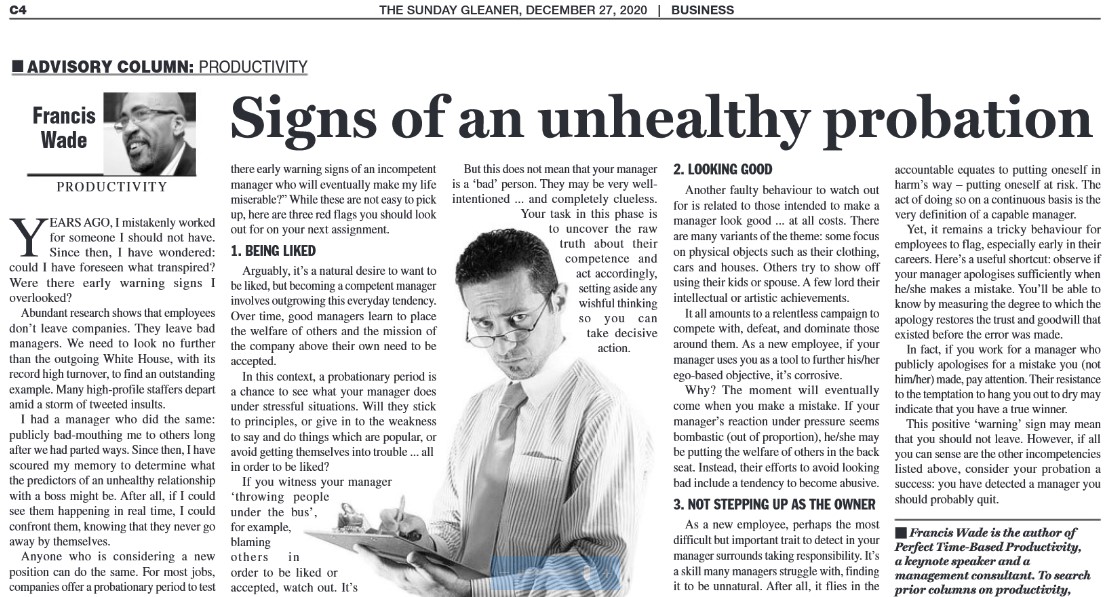Years ago, I mistakenly worked for someone I shouldn’t have. Since then, I have wondered: could I have foreseen what transpired? Were there early warning signs I overlooked?
Abundant research shows that employees don’t leave companies; they leave bad managers. We need look no further than the outgoing White House, with its record high turnover, to find an outstanding example. Many high-profile staffers depart (and have left) amidst a storm of tweeted insults.
I had a manager who did the same: publicly bad-mouthing me to others long after we had parted ways. Since then, I have scoured my memory to determine what the predictors of an unhealthy relationship with a boss might be. After all, if I could see them happening in real-time, I could confront them, knowing that they never go away by themselves.
Anyone who is considering a new position can do the same. For most jobs, companies offer a probationary period to test an employee’s suitability. In their eagerness to please, few new hires consciously realize it’s also a unique opportunity to ask: “Are there early warning signs of an incompetent manager who will eventually make my life miserable?” While these aren’t easy to pick up, here are three red flags you should look out for on your next assignment.
1. Being Liked
Arguably, it’s a natural desire to want to be liked, but becoming a competent manager involves outgrowing this everyday tendency. Over time, good managers learn to place the welfare of others and the mission of the company above their own need to be accepted.
In this context, a probationary period is a chance to see what your manager does under stressful situations. Will they stick to principles, or give in to the weakness to say and do things which are popular, or avoid getting themselves into trouble…all in order to be liked?
If you witness your manager “throwing people under the bus” i.e. blaming others in order to be liked or accepted, watch out. It’s safe to assume that the worst treatment meted out to others will one day be directed at you.
But this doesn’t mean that your manager is a “bad” person. They may be very well-intentioned…and completely clueless. Your task in this phase is to uncover the raw truth about their competence and act accordingly, setting aside any wishful thinking so you can take decisive action.
2. Looking Good
Another faulty behaviour to watch out for are those intended to make a manager look good…at all costs. There are many variants of the theme: some focus on physical objects such as their clothing, cars and houses. Others try to show off using their kids or spouse. A few lord their intellectual or artistic achievements.
It all amounts to a relentless campaign to compete with, defeat, and dominate those around them. As a new employee, if your manager uses you as a tool to further his/her ego-based objective, it’s corrosive.
Why? The moment will eventually come when you make a mistake. If your manager’s reaction under pressure seems bombastic (i.e. out of proportion), he/she may be putting the welfare of others in the back seat. Instead, their efforts to avoid looking bad include a tendency to become abusive.
3. Not Stepping Up as the Owner
As a new employee, perhaps the most difficult (but important) trait to detect in your manager surrounds taking responsibility. It’s a skill many managers struggle with, finding it to be unnatural. After all, it flies in the face of self-protective human behaviour which is so essential to our basic survival.
In fact, holding oneself publicly accountable equates to putting oneself in harm’s way…at risk. The act of doing so on a continuous basis is the very definition of a capable manager.
Yet, it remains a tricky behavior for employees to flag, especially early in their careers. Here’s a useful shortcut: observe if your manager apologizes sufficiently when he/she makes a mistake. You’ll be able to know by measuring the degree to which the apology restores the trust and goodwill that existed before the error was made.
In fact, if you work for a manager who publicly apologizes for a mistake you (not him/her) made, pay attention. Their resistance to the temptation to hang you out to dry, may indicate that you have a true winner.
This positive “warning” sign may mean that you shouldn’t leave. However, if all you can sense are the other incompetencies listed above, consider your probation a success: you have detected a manager you should probably quit.

